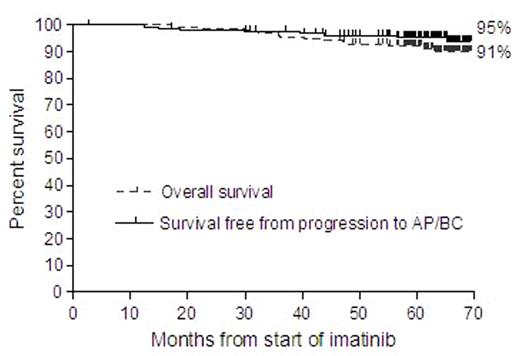Abstract
Background: Imatinib (IM) is the drug of choice for the treatment of Ph+ CML, where a complete cytogenetic response (CCgR) is achieved in more than 80% of early chronic phase (ECP) patients, with a 5-year survival of 90% (Simonsson B, Blood 2005). In the patients who initiated the treatment in late chronic phase (LCP) the response rate is lower and the long-term effect on survival is not yet determined.
Aim: We monitored the hematologic, cytogenetic and molecular response to IM in a cohort of 291 patients who were treated with IM in LCP, with focus on progression-free survival and overall survival of complete cytogenetic responders.
Methods: Two hundred and ninety-one patients with Ph+ CML in LCP were enrolled in a national prospective study of the GIMEMA CML Working Party in 2001, and were monitored for cytogenetic response and for molecular response every 6 months. Cytogenetics was performed on bone marrow cells with conventional methods. Molecular response was assessed on bone marrow or peripheral blood samples by quantitative PCR (RQ-PCR) using TaqMan methodology and expressing the results as a ratio of BCR-ABL to ABL x100. Patient age ranged from 19 to 82 years (median 52 years). The duration of chronic phase prior to IM treatment ranged from 1 to 202 months (median 38 months). Treatment was IM 400 mg daily through all the study period, with a few exceptions of dose increase to 600 or 800 mg. The median follow-up time after the first IM dose is 62 months.
Results: One hundred and sixty patients (55%) achieved a CCgR in 3 to 62 months (median 6 months) after the first IM dose and 126 of them (79%) are still in continuous CCgR after 5 years. For the 160 patients the 5-year survival free from progression to accelerated or blastic phase is 95% and overall survival is 91%. These data are very similar to those reported for the ECP patients in the IRIS study (Simonsson B, Blood 2005). At 5 years, 107 patients were evaluated for molecular response; 62% of them were in major molecular response with a BCR-ABL/ABL ratio lower than 0.10. The BCR-ABL transcript was undetectable in 7 cases by RQ-PCR and in 2 cases by nested PCR. No patient developed heart failure.
Conclusions: We confirm that in LCP the CCgR rate to IM is lower than in ECP, but we show that for the complete cytogenetic responders progression-free and overall survival are likely to be as good as for ECP patients, suggesting that the quality of the CCgR is prognostically more important than the duration of leukemia prior to IM treatment.
Disclosure: No relevant conflicts of interest to declare.
Acknowledgments: European LeukemiaNet, COFIN 2003 (M. Baccarani), AIL, AIRC, Fondazione Del Monte di Bologna e Ravenna, FIRB, Ateneo 60% grants.
Author notes
Corresponding author


